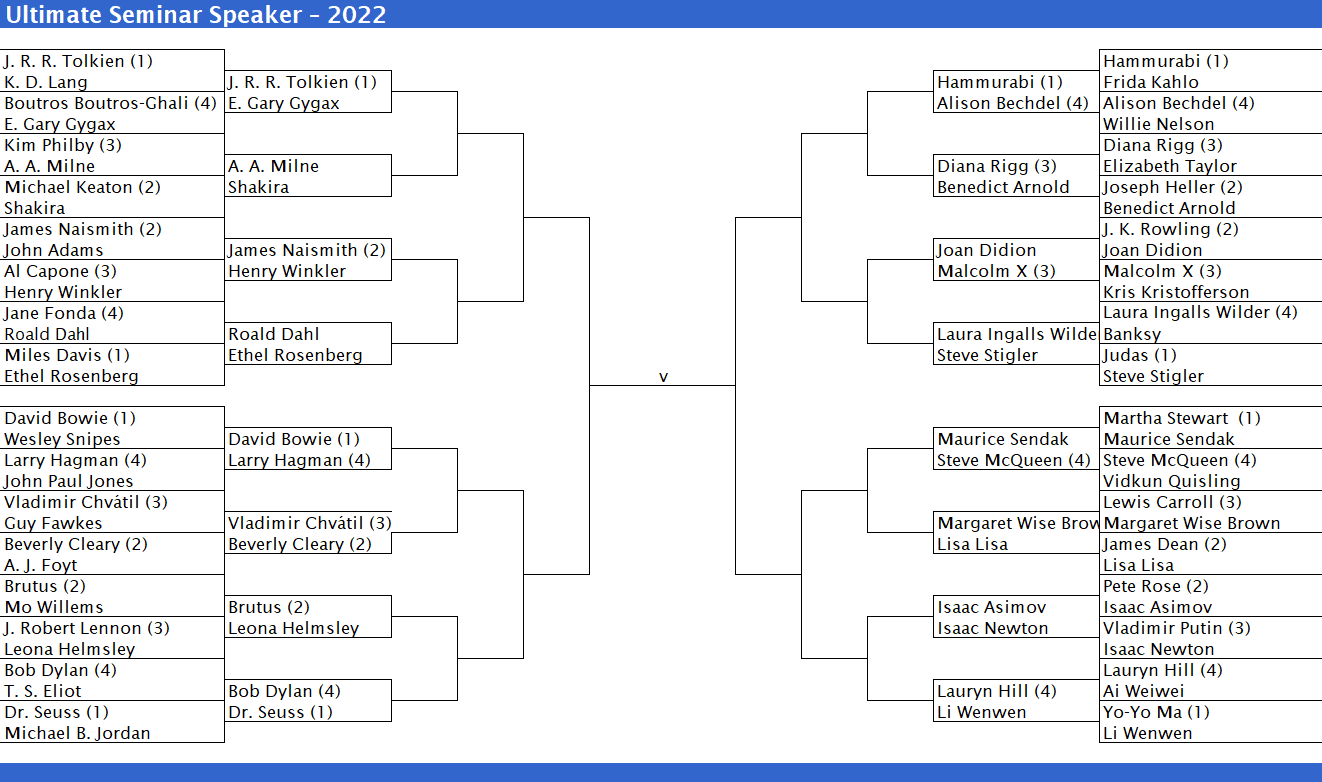
In the contest between the fake spy and the real traitor, Manuel writes:
Diana Rigg exploits as an spy, albeit fictional, are memorable. The second Mrs. Arnold would stand more than a fighting chance against her, as she knew everything about cryptography, invisible ink and the like. But even the absent Mr. Peel seems more interesting than his husband.
And Raghu writes:
I re-watched “The Great Muppet Caper” a few years ago, which was better than I remembered. Diana Rigg is in it; Benedict Arnold is not. As “… the Muppets are caught up in a jewel heist while investigating a robbery in London” [Wikipedia], Ms. Rigg can no doubt comment on Anglo-American relations, so we don’t need Arnold for that. Plus, from his Wikipedia page, he seems truly unpleasant.
I’m convinced. Diana it is. Sorry, Jonathan!
Today’s matchup
A cool person versus a person known by an initial. Two intellectuals who became famous in the 60s. One of them was not played by Denzel Washington.
This is a tough one. Both are deserving of a quarterfinal slot – if only they were in different brackets!
I’d have to go with Malcolm X, in part because while he’s a household name, I bet very few have actually heard him speak or read his writings directly. Most people know him through popular reputation, which often provides an objectively inaccurate perspective of his beliefs and views.
Joan Didion, on the other hand – most people who know of her have a fairly accurate idea of what she wrote about. She would no doubt have wonderful things to say, and I would love to hear them, but hearing Malcolm X in his own words would be a valuable educational enrichment for everyone that would fundamentally change their understanding of the civil rights movement. Whether they agree or disagree with his views, they would have a dramatically better understanding of an important period of history that is very relevant to understanding the present as well.
He is a very high achieving Malcolm, and there is Little prospect that he will be Pope, so we need not worry about Gladwell before.
Baez, Collins, Rivers, Blondell, Miro. She was born to a life of privelege.
My father, born in 1925, started a collection of fellow 1925-ers. Malcolm X, Medgar Evers, Yukio Mishima.
Father managed to avoid assassination, suicide following a failed coup attempt, and the similar violent ends that everyone he added to his list met, only succumbing to medical malpractice at an age that the Japanese government (with their policy of letting Covid rip) is trying to prevent me from making it anywhere near to. Whatever, 1925 was an interesting year. People born that year were, like father, pretty much the youngest to fight (or potentially need to fight) in WWII. Father volunteered out of high school, and reports being put up in a hotel for one night before being shipped off to boot camp, which meant it took him a day and a half to realize he had made the worst mistake of his life. Malcolm X figured out ahead of time that being a soldier was a bad idea, so faked insanity and avoided service, so smarter than my dad, in one aspect at least.
I seem to have missed JD, despite growing up on Beacon Hill in the 60s glued to Boston area college FM radio, I was rather into the “realities of the counterculture of the 1960s” that JD wrote about. Go figure. Like my mom, JD was an English major at college. Mom was a lifelong fan of Anthony Trolloppe. Mom was walking up a street on the hill at one point during the 60s, and a hippy was playing with a puppy in a doorway. “Oh, what a cute puppy!” says mom. “What’s its name?” “Jude” grunted the hipppy. “Oh, how wonderful, Jude the Obscure!” said mom. Thus demonstrating conclusively that language is useless for communication.
Hard decision, but I’ll go for Malcolm X, since he had the good sense to avoid the war.
Another point for the 1925-ers vs. the English majors: Wikipedia reports that Trolloppe was one of the most prolific writers in history, and his complete works on Amazon is over 15,000 pages, three times as long as Shakespeare’s. But Mishima’s complete works consists of 41 volumes at about 700 pages each, well over 25,000 pages. Slam dunk city. And that’s despite giving up writing at the age of 45, whereas Trolloppe lived to a ripe old age (well, for the time: 60 or so).
The NYPL has a Malcolm X collection and has just acquired Joan Didion’s papers (the NYT reported this on January 26). It’s this “just acquired” that intrigues me, because if Didion was hoping to read from some of her own notes, she suddenly will have to wait until they’ve been sorted, catalogued, etc.–which could take a while, since her archive spans 240 linear feet of material. This means that she may well have to improvise, which would be fun. Malcolm X, on the other hand, has had ample notice of his papers’ location; he would have no trouble making photocopies, if he wished. There’s nothing wrong with a prepared speech, but I can’t get rid of the yearning for surprise. Therefore I vote for Didion.